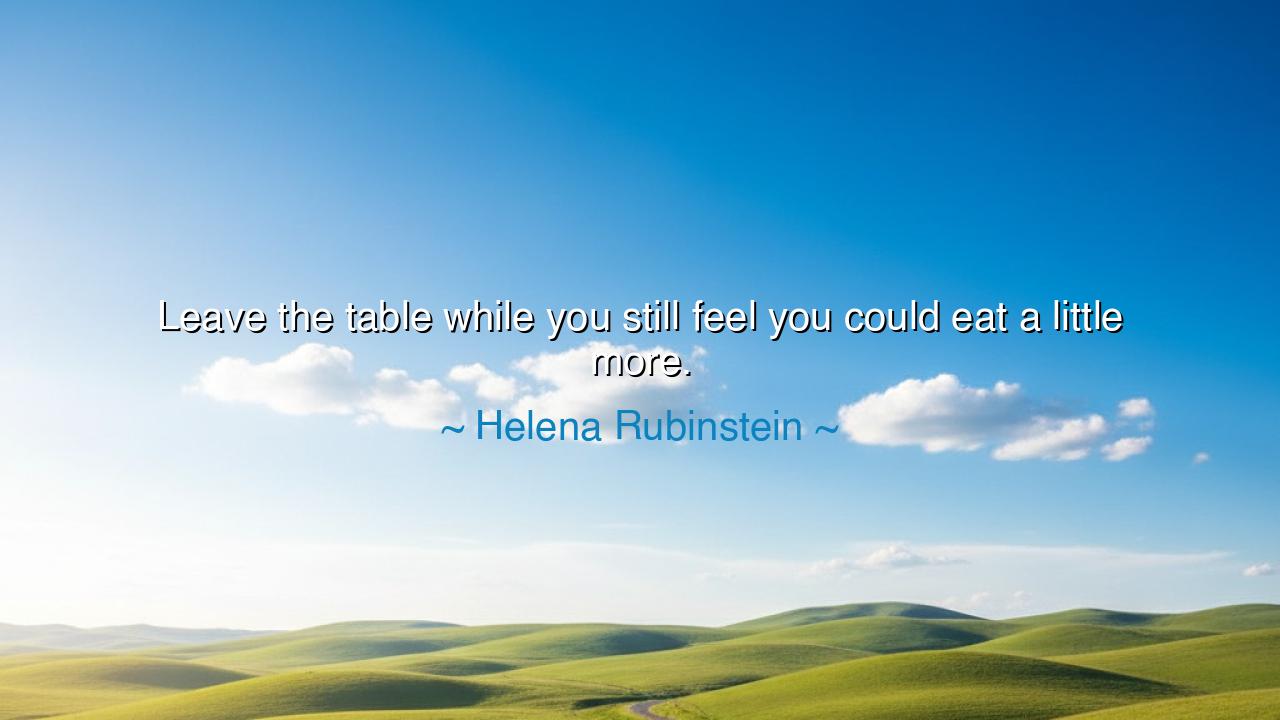
Leave the table while you still feel you could eat a little more.






In the timeless dance of the body and soul, where each action carries consequences for our well-being, there is profound wisdom in the words of Helena Rubinstein: "Leave the table while you still feel you could eat a little more." This seemingly simple piece of advice holds a deep truth about self-control, moderation, and the sacred art of living in balance. To walk away from the table before indulgence turns to excess is not merely a practice in dieting, but a reflection of an ancient wisdom passed down through the ages: true health and well-being are found in restraint—the ability to honor the body's needs without falling prey to indulgence or excess.
The ancient Greeks, revered for their insights into the harmony of body and mind, understood the power of moderation in all things. Socrates taught that the pursuit of virtue was the path to true fulfillment, and that virtue was never found in extremes. The Golden Mean, a concept developed by Aristotle, reflected this very idea—that balance in life was the key to achieving not just happiness, but true peace. To overindulge in food, as in any aspect of life, was to invite disorder and discomfort. Rubinstein’s words echo this ancient wisdom: the key to a fulfilled life lies not in satisfying every hunger or desire, but in knowing when to stop—before we lose control.
The Romans, too, understood the importance of self-discipline and moderation. Cicero, the great philosopher and statesman, wrote extensively about the importance of balance in life. He emphasized that to live with virtue and wisdom was to restrain oneself from the dangers of excess, whether in food, drink, or pleasure. The Roman elite enjoyed great banquets, yet they were also aware that overeating would bring not just physical discomfort but moral degradation. For them, sparing the body from indulgence was a way to maintain clarity of mind and spirit. In this sense, Rubinstein’s advice can be seen as a modern reflection of the Roman idea that self-control is the foundation of a virtuous life—one that leads to both physical health and mental clarity.
The great philosopher Seneca, a Stoic, echoed similar sentiments in his teachings. He believed that life was about living in accordance with nature and knowing the limits of one’s desires. In his writings, Seneca warned that excessive indulgence, whether in food or pleasure, would cloud one’s judgment and weaken the body. His teachings align with Rubinstein’s advice: to leave the table before you are overly full is to practice wisdom, to honor the body’s true needs, and to exercise self-mastery. To refuse to give in to the fleeting pleasure of excess is to maintain the clarity and strength that comes with moderation and restraint.
The story of Diogenes, the infamous Cynic philosopher, is a vivid example of this wisdom. Diogenes, known for his eccentricity and disregard for societal norms, often practiced radical simplicity. In one famous anecdote, he is said to have lived in a barrel and to have embraced hunger and poverty as a way to free himself from the chains of excess and desire. He often restricted his food intake, choosing not to indulge even when given the opportunity. While his methods were extreme, they served as a reminder that freedom comes not from indulgence but from the control of one’s desires. Diogenes’ life, though extreme, illustrates that true strength lies in the ability to walk away before indulgence turns into enslavement—a concept that Rubinstein beautifully captures.
The lesson in Rubinstein’s words is profound: balance in life, especially in matters of consumption, is not just about diet but about a larger philosophy of living. The ability to leave the table while still feeling a hint of hunger is not an exercise in denial, but an exercise in wisdom. It is the practice of knowing when to stop, of maintaining a sense of moderation and self-awareness in the face of temptation. This practice aligns with the ancient teachings that true fulfillment comes from embracing the middle path—the balance between excess and deprivation, indulgence and restraint.
As you navigate your own path, remember the timeless wisdom of the ancients and Rubinstein: cultivate balance in all aspects of your life. In your eating, in your thoughts, and in your actions, strive for moderation. Learn to recognize when enough is enough, and to honor your body by stopping before you overstep. In this practice, you will find freedom—freedom from the chaos of excess and the peace that comes from embracing the simple wisdom of self-control. Just as the Greeks and Romans practiced restraint to preserve their strength, so too can you walk the path of moderation, finding a life that is full, not through indulgence, but through mindful choices.






AAdministratorAdministrator
Welcome, honored guests. Please leave a comment, we will respond soon